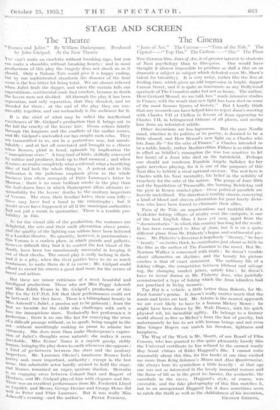" Joan of Arc." The Curzon : --" Turn of the Tide."
The Capitol-7." Top Hat." The Carlton--" She." The Plaza TIIE German film, Joan-of Are, is of greater interest to students of Nazi psychology than to - film-goers. One would have thought it almost impossible to produce so dull a film on so dramatic a subject (a subject which defeated even Mr. Shaw's talent for triviality). It is very noisy, rather like the Zoo at feeding time, which gives an odd impression in bright, dapper Curzon Street, and it is quite as inaccurate as any Hollywood spectacle of The Crusaders order but not so funny. The author, "Herr Gerhard Menzel, we are told, has " made intensive studies in France, with the result that new light has been shed on some of the most famous figures of history." But I hardly think that any research can have helped him to reject Joan's meeting with Charles VII at Chinon in favour of Joan appearing to Charles VII, in beleaguered Orleans of all places, and saving him from an infuriated rabble.
Other inventions are less ingenuous. But the pure Nordic mind, whether in its politics or its poetry, is doomed to be a little absurd, and Herr Menzel's new light on a Charles who lets Joan die " for the sake of France," a Charles intended to be a noble, lonely, rather Machiavellian Fiihrer is as ridiculous in effect as Schiller's conception (he was too sensitive to let her burn) of a Joan who died on the battlefield. PerhaPs one should not condeirm Fraidein 'Angela Salloker for her quite -nerveless playing,' for it is one of the purposes of this Nazi film to belittle a rival national saviour. The real hero is Charles with his Nazi' mentality, his belief in the nobility of treachery for the sake of the nation. The purge of June 80th and the liquidation of Tremouille, the burning Reichstag and the pyre in Rouen market-place—these political parallels are heavily underlined. The direction is terribly sincere, conveying a kind of blond and shaven admiration for poor lonely dicta- tors who have been forced to eliminate their allies.
Turn of the Tide, an unpretentious and truthful film of a Yorkshire fishing village, of rivalry over the prabpots, is one of the best English films I have yet seen, apart from the " documentaries " in which this country has long led the world. It has been compared to Man: of Aran; but it is on a quite different plane from Mr. Flaherty's bogus and sentimental pic- ture. Mr. Flaherty's direction is hopelessly "literary," he lays " beauty ," on inches thick, he contributes just about as little to the film ilw author of The Fountain to the novel. But Mr. Norman Walker is concerned with truth ; he doesn't trouble about silhouettes on skylines, and the beauty his picture catches is that Of exact statement. The ordinary life of a fishing village, the competition between lifeboat and salvage tug, the changing market prices, satisfy him : he doeSn't have to invent drama -as Mr. Flaherty does, who Pairifully reconstructed a type of fishing .'which the Aran islanders had not practised in living memory: Top Hat is a vehicle, a little better than Roberta, for Mr. Fred Astaire' s genius. It doesn't really matter much that the music and lyrics arc bad. Mr. Astaire is the nearest approach we arc ever likely to have to a human Mickey Mouse ; he might have been drawn by Mr. Walt Disney, with his quick physical wit, his incredible agility. He belongs to a fantasy world alitioit as free as.MiekeY's front the law of gravity, but unfortunately he has to 'act with human' beings and not even Miss Ginger Rogers can Match' his freedom, lightness and happiness.
• The Wag of the Week is Mr. Shortt, of our Board of Film Censors, who has granted to this quite pleasantly bawdy film the Universal certificate lie has refused to the earnest manly Boy Scout virtues of Rider Haggard's She. I cannot write. reasonably about this film, for few books at one time excited me more than King Solomon's Mines and AlanQuartermaine. She always bore its symbolism a little heavily : at that age one was not so interested in the lovely immortal woman and the flame of life as in the great ice barrier, the avalanche, the cannibals' -in the eaves. Haggard's style, of course, was execrable, and the fake photography of this film matches it, but to an unrepentant Haggard fan it does sometimes seem to catch the thrill as well as the childishness of his inventions.
GRAHAM GREENE.


























































 Previous page
Previous page